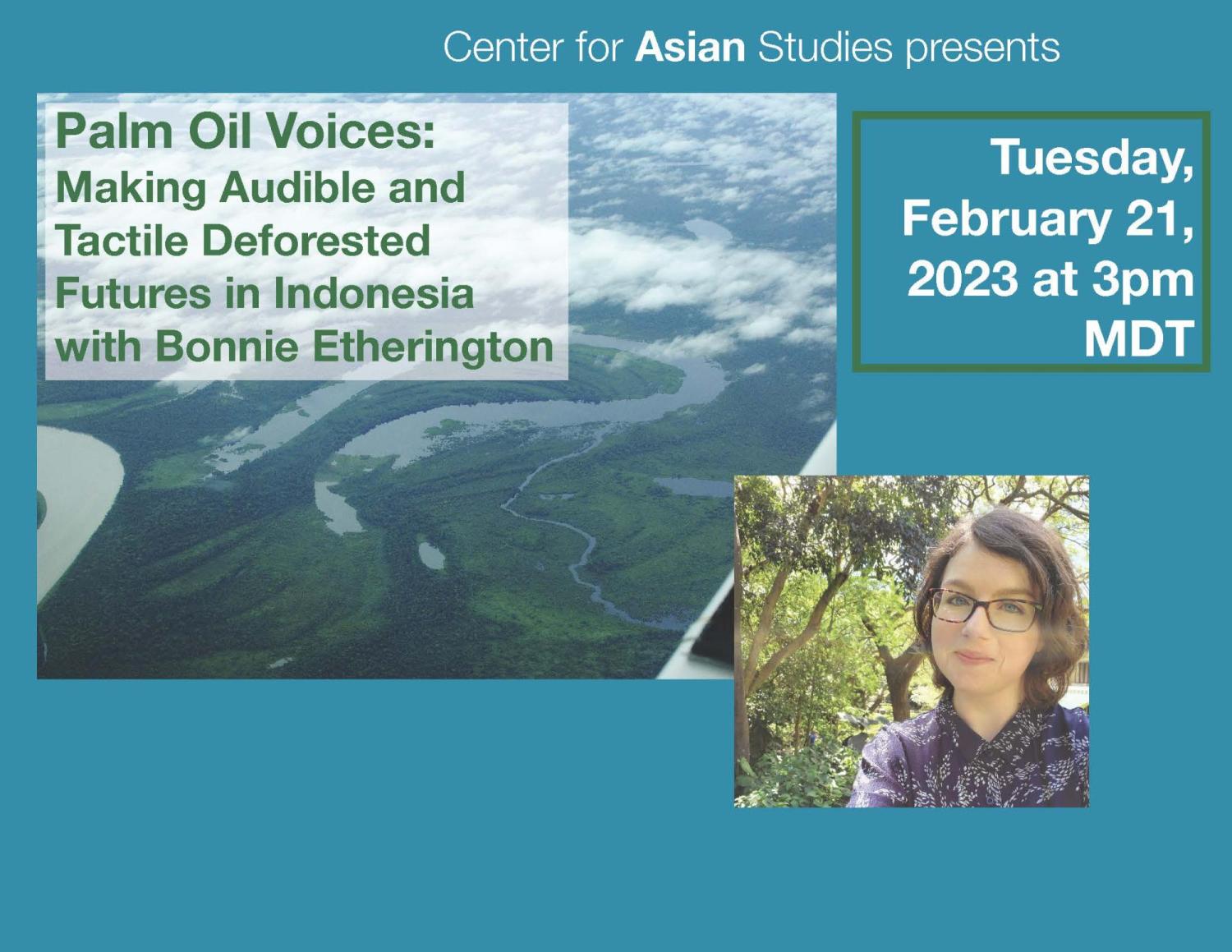Palm Oil Voices: Making Audible and Tactile Deforested Futures in Indonesia 2023.02.21

Tuesday, February 21 at 3pm MST
In person CASE room W313 - in-person capacity is very limited
Bonnie Etherington will be speaking via Zoom, and will not be on the Boulder Campus for this event.
Event hosted by Carla Jones, Associate Professor of Anthropology CU Boulder
With Discussant Colleen Scanlan Lyons, Governors’ Climate and Forests Task Force
In her book Indigenous Species (2016), Indonesian writer Khairani Barokka writes from the perspective of a kidnapped woman on a boat in a river “drifting down open sores of forest” cleared for palm oil plantations in Kalimantan. She writes that this oil later coopts and transports “eons of intricacies and strength/ From the forest to molecular form/ On a woman’s lipstick bottle in Iowa”. In her poem that she also presents in Braille, I argue that Barokka makes audible and tactile the often invisible movements, connections, and interdependent relationships of palm oil that sustain modernity in other parts of the world. I will also read two texts by West Papuan authors: a song by elder Gerardus Gebze, and a poem by Aleks Giyai, which are both about the devastating impacts of palm oil on a forest landscape in their homeland: specifically the impact of oil palms on a staple lowland Papuan food resource, sago. Read together, these literary works present multidimensional, multi-vocal views of (de)forested kinships and interconnections in regions critical for palm oil production in Indonesia. These “voices” sketch out unexpected geographies of palm oil and intervene into global conversations about oil, modernity, and capitalism in the face of precarious environmental futures.
Bonnie Etherington was an Environmental Futures Postdoctoral Fellow at CU Boulder. She is currently a Lecturer in Literary & Creative Communication in the School of English, Film, Theatre, Media Studies & Art History at Victoria University in Wellington, New Zealand.
Bonnie earned her PhD in English from Northwestern University, where she was also a Presidential Fellow. She is at work on a book manuscript entitled One Salt Water: Writing the Pacific Ocean in Contemporary Indigenous Protest Literatures, and her scholarly work is forthcoming in The Contemporary Pacific, and recently published in New Oceania: Modernisms and Modernities in the Pacific (Routledge, 2019). Her first novel, The Earth Cries Out (Vintage NZ, 2017), was shortlisted for the William Saroyan International Prize for Writing and long-listed for the Ockham New Zealand Book Awards. At Northwestern she was also a team member with the Humanities Without Walls project, "Indigenous Art and Activism in Changing Climates: The Mississippi River Valley, Colonialism, and Environmental Change." Bonnie was born in Aotearoa New Zealand and raised in West Papua.
This talk builds on a CNAIS-sponsored talk Bonnie gave in November, 2020 on Weaving Trans-Indigenous Solidarities in the Pacific: The Case of West Papua:https://www.colorado.edu/cnais/2020/11/05/weaving-trans-indigenous-solidarities-pacific-case-west-papua
Co-Sponsored by: CNAIS, Ethnic Studies, Anthropology, Sociology, CMCI/Center for Communication and Democratic Engagement, Michigan State University Asian Studies Center, The Carolina Asia Center, and Metropolitan State University of Denver

